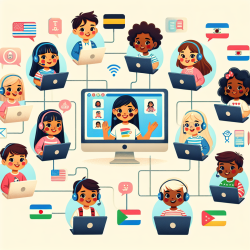Empowering Practitioners: Unleashing the Potential of Global Health Law for Children's Success
In the realm of speech-language pathology, the pursuit of excellence in therapy outcomes for children is a shared goal among practitioners. As professionals dedicated to enhancing communication skills, it's crucial to recognize the broader context in which our work operates. The recent advancements in global health law, as outlined in the research article "Global Health Law: International Law and Public Health Policy," provide a valuable framework for understanding how international law influences public health and, by extension, our practice.
The Significance of Global Health Law
Global health law has evolved significantly over the past two decades, shifting from a primarily national focus to a more integrated international approach. This transformation is driven by globalization, which has increased the interconnectedness of health issues across borders. For practitioners in speech-language pathology, this means that the policies and legal frameworks established at the international level can have direct implications for our work with children.
The research highlights the role of international organizations such as the World Health Organization (WHO) and the World Trade Organization (WTO) in shaping global health law. These organizations have developed binding international agreements and legal instruments that influence national health policies. For instance, the WHO Framework Convention on Tobacco Control and the International Health Regulations are examples of how international law can address public health concerns that transcend national boundaries.
Implications for Speech-Language Pathology
Understanding the implications of global health law can empower practitioners to advocate for policies that support the well-being of children. Here are a few ways practitioners can leverage the insights from this research:
- Advocacy for Policy Change: By staying informed about international health policies, practitioners can advocate for changes at the national and local levels that align with global standards. This can include promoting access to essential health services and ensuring that children's rights to health are upheld.
- Collaboration with International Organizations: Engaging with international organizations and participating in global health initiatives can provide opportunities for practitioners to contribute to policy development and implementation. This collaboration can enhance the effectiveness of therapy services provided to children.
- Incorporating Global Standards into Practice: Practitioners can integrate global health standards into their therapy practices, ensuring that interventions are evidence-based and aligned with international guidelines. This approach can enhance the quality of care provided to children and improve therapy outcomes.
Encouraging Further Research
The research article emphasizes the need for ongoing exploration of the intersection between global health law and public health policy. For practitioners in speech-language pathology, this presents an opportunity to engage in further research that examines how international legal frameworks can support the development of effective therapy interventions for children.
By conducting research that explores the impact of global health policies on speech-language pathology, practitioners can contribute to the body of knowledge that informs policy decisions. This research can also provide valuable insights into how international law can be leveraged to address the unique challenges faced by children with communication disorders.
To read the original research paper, please follow this link: Global Health Law: International Law and Public Health Policy.










